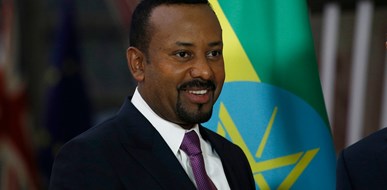Blog post: A Nobel Peace Prize for Africa, but what about the other half of the story?
Published 15 October 2019By Misha Plagis

Ethiopian Prime Minister Abiy Ahmed became the 12th African Nobel Peace Prize winner for his contributions to the 2018 peace deal between Ethiopian and Eritrea. ©Shutterstock.
In a new blogpost Asser researcher Dr Misha Plagis asks: “The Nobel Prize for Ethiopian prime minister Abiy Ahmed is a cause for celebration. But what about the other half of the deal: the situation of the Eritreans?”
Since 1960, when Albert Lithuli became the first African to win the Nobel Peace Prize, last week Ethiopian Prime Minister Abiy Ahmed joined a growing list of Africans contributing to peace on the continent. He became the 12th African Nobel Peace Prize winner for his contributions to the 2018 peace deal between Ethiopian and Eritrea - which ended twenty years of bitter conflict - giving us cause to celebrate. The prize recognises the Ethiopian-Eritrean peace deal as a significant move to promote peace in the region. But when we look at it from the perspective of the protection of human rights in Eritrea, our optimism might be premature. There is a reason why Abiy Ahmed’s counterpart in the peace deal, Eritrean president Isaias Afwerki, did not receive an award.
‘North Korea of Africa’
Eritrea is one of the most repressive regimes in Africa, as well as one of the most secretive, sometimes referred to as the North Korea of Africa. There is no free press in the country, there are harsh restrictions on the movements of its people, and in a UN report, Eritrea has been accused of potential crimes against humanity. The peace deal with its neighbour Ethiopia led to the reopening of the border between the two states, which is also Eritrea’s largest land border. But the hope that opening it would lead to more free movement of Eritreans (and, therefore, also more information on the conditions in Eritrea) has faded. The reality is that this option remains open only to those lucky few who can afford airfare.
The reopening of the border increased hope for trade to pick up between the two countries. But despite Ethiopia being a regional hegemon, it is not one of Eritrea’s largest trade partners. Although African states are not well known for using trade to pressure for human rights, the dire economic circumstances in Eritrea could certainly benefit from increased trade. Despite initial relief in terms of the scarcity and costs of goods in Eritrea, reports show that the signing of new business deals has not led to an actual increase in cross-border business. Therefore, while the regime remains oppressive, the economic position of many Eritreans who live below the poverty line has not changed, and it is not likely that this will change anytime soon.
Human rights
The Nobel Peace Prize has a history of being tied to human rights. Many of Africa’s previous winners were on the forefront of fighting for human rights, environmental rights and democracy in their nations, notably Desmond Tutu, Ellen Johnson Sirleaf, Leymah Gbowee, Wangari Maathai, and Nelson Mandela.
With the prize, Abiy Ahmed is being recognised for his domestic efforts in stabilising factionalism in Ethiopia and avoiding ethnic conflict, releasing political dissidents, and other activities, aside from his peace efforts in the Horn of Africa. However, the same cannot be said for his counterpart in the 2018 peace deal, President Isaias Afwerki, who has been the president of Eritrea since 1993. Despite ratifying the African Charter on Human and Peoples’ Rights in 1999, and other major international treaties since Eritrea’s independence in 1991, the human rights situation in Eritrea is still dire: indefinite national service continues, and the flows of refugees fleeing the country has not decreased, many of whom now live in Ethiopian refugee camps.
The peace deal with Ethiopia provided a glimmer of hope for slightly increased openness, and the chance for better economic conditions in Eritrea. But this hope is fading quickly, and with it goes the dream that the peace deal would improve the general human rights situation in Eritrea. With a long history of human rights abuses, and an increasingly repressive regime that flouts regional and international human rights law, we are likely to be left wanting - in terms of the wider effects of the 12th Nobel Peace Prize – for improvements to arrive in the region.
Asser researcher Dr Misha Plagis is an expert on the African regional human rights system. She works on the African Court of Human and Peoples’ Rights, as well as African Union law, international human rights, and transnational environmental law in Africa. Her work is part of the research strand Advancing Public Interests in International and European law, which critically examines how International and European law may further the protection of public interests in a globalising (and privatising) world.
